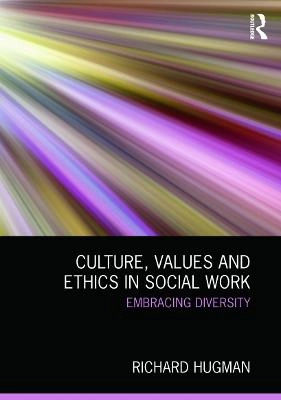"This groundbreaking book examines the ways in which questions of culture and diversity impact on the values and ethics of social work. Using detailed case studies to illustrate key points for practice, Richard Hugman discusses how social workers can develop culturally-competent ethical practice and work creatively with the tensions it sometimes involves. Debates rage over whether there is a core set of unchangeable social work values or whether they might be different at different times and for different people. This textbook proposes a new approach of 'ethical pluralism' for social work practice, in which both shared humanity and the rich variety of cultures contribute to a more dynamic way of understanding social work's underpinning values and ethics. In particular, this book explores the implications of a pluralist approach to ethics for the central questions of: Human rights and social justice Caring relationships Social and personal responsibilities Agency and autonomy Values such as truth, honesty, openness, service and competence. It is vital that social workers understand the values and ethics of their profession as a crucial part of the foundations on which practice is built and this is the only text to explore the connections between culture, values and ethics and fully develop the pluralist approach in social work. Culture, Values and Ethics in Social Work is essential reading for all social work students and academics. "-- "This groundbreaking book examines the ways in which questions of culture and diversity impact on the values and ethics of social work. Using detailed case studies to illustrate key points for practice, Richard Hugman discusses how social workers can develop cross-cultural engagement in practice and work creatively with the tensions it sometimes involves. Debates rage over whether there is a core set of unchangeable social work values or whether they might be different at different times and for different people. This textbook proposes a new approach of 'ethical pluralism' for social work practice, in which both shared humanity and the rich variety of cultures contribute to a more dynamic way of understanding social work's underpinning values and ethics. In particular, this book explores the implications of a pluralist approach to ethics for the central questions of: Human rights and social justice Caring relationships Social and personal responsibilities Agency and autonomy Values such as truth, honesty, openness, service and competence. It is vital that social workers understand the values and ethics of their profession as a crucial part of the foundations on which practice is built and this is the only text to explore the connections between culture, values and ethics and fully develop the pluralist approach in social work. Culture, Values and Ethics in Social Work is essential reading for all social work students and academics"-- Dawson
Åtkomstkoder och digitalt tilläggsmaterial garanteras inte med begagnade böcker





















